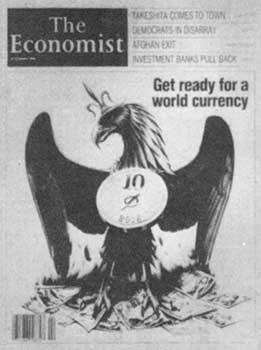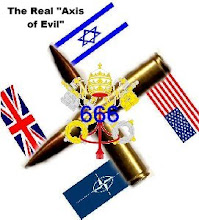Towards a Global Currency and World Government
By Andrew G. Marshall

APRIL 07, 2009 "Global Research" -- -Following the 2009 G20 summit, plans were announced for implementing the creation of a new global currency to replace the US dollar’s role as the world reserve currency. Point 19 of the communiqué released by the G20 at the end of the Summit stated, “We have agreed to support a general SDR allocation which will inject $250bn (£170bn) into the world economy and increase global liquidity.” SDRs, or Special Drawing Rights, are “a synthetic paper currency issued by the International Monetary Fund.” As the Telegraph reported, “the G20 leaders have activated the IMF's power to create money and begin global "quantitative easing". In doing so, they are putting a de facto world currency into play. It is outside the control of any sovereign body. Conspiracy theorists will love it.”[1]
The article continued in stating that, “There is now a world currency in waiting. In time, SDRs are likely to evolve into a parking place for the foreign holdings of central banks, led by the People's Bank of China.” Further, “The creation of a Financial Stability Board looks like the first step towards a global financial regulator,” or, in other words, a global central bank.
It is important to take a closer look at these “solutions” being proposed and implemented in the midst of the current global financial crisis. These are not new suggestions, as they have been in the plans of the global elite for a long time. However, in the midst of the current crisis, the elite have fast-tracked their agenda of forging a New World Order in finance. It is important to address the background to these proposed and imposed “solutions” and what effects they will have on the International Monetary System (IMS) and the global political economy as a whole.
A New Bretton-Woods
In October of 2008, Gordon Brown, Prime Minister of the UK, said that we “must have a new Bretton Woods - building a new international financial architecture for the years ahead.” He continued in saying that, “we must now reform the international financial system around the agreed principles of transparency, integrity, responsibility, good housekeeping and co-operation across borders.” An article in the Telegraph reported that Gordon Brown would want “to see the IMF reformed to become a ‘global central bank’ closely monitoring the international economy and financial system.”[2]
On October 17, 2008, Prime Minister Gordon Brown wrote an op-ed in the Washington Post in which he said, “This week, European leaders came together to propose the guiding principles that we believe should underpin this new Bretton Woods: transparency, sound banking, responsibility, integrity and global governance. We agreed that urgent decisions implementing these principles should be made to root out the irresponsible and often undisclosed lending at the heart of our problems. To do this, we need cross-border supervision of financial institutions; shared global standards for accounting and regulation; a more responsible approach to executive remuneration that rewards hard work, effort and enterprise but not irresponsible risk-taking; and the renewal of our international institutions to make them effective early-warning systems for the world economy.[Emphasis added]”[3]
Click here: http://informationclearinghouse.info/article22370.htm to read more.


No comments:
Post a Comment